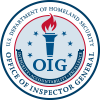FEMA did not take sufficient actions to prevent fraud, waste, and abuse of transportation assistance funds for vehicles considered damaged or destroyed by Hurricanes Harvey, Irma, and Maria in FY 2017. These weakness occurred because FEMA does not require that agencies collect and retain documentation used to establish applicant eligibility; consider pre-disaster vehicle market value when determining award amounts; provide guidance to state, territorial and tribal governments on how to set transportation assistance thresholds; and conduct post-payment reviews to ensure funds are spent appropriately. We made three recommendations that, when implemented, will help FEMA ensure it is spending Federal funds for transportation assistance properly. FEMA concurred with one recommendation and non-concurred with two recommendations.
Open Recommendations
| Recommendation Number | Significant Recommendation | Recommended Questioned Costs | Recommended Funds for Better Use | Additional Details | |
|---|---|---|---|---|---|
| 1 | No | $0 | $0 | ||
| We recommend the FEMA Assistant Administrator for Recovery strengthen FEMA's transportation assistance policies and procedures and coordinate with FEMA Assistant Administrator for Mission Support to: a) require the collection and retention of eligibility documentation or where applicable, document the steps taken to validate applicant statements in FEMA's system of record, and b) ensure future information technology updates support the collection, use, and retention of unique Vehicle Identification Numbers to enable FEMA to cross-reference national databases to confirm insurance coverage and identify applicants' second vehicles. | |||||
| 3 | No | $0 | $0 | ||
| We recommend the FEMA Assistant Administrator for Recovery, in accordance with the Stafford and Improper Payments Acts; develop controls to identify payments not used for critical transportation needs. | |||||


